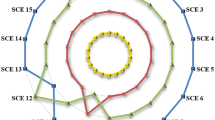Abstract
With the intensification of market competition and the improvement of environmental awareness, sustainable development has become the theme of the development of the global society in the twenty-first century. More and more people are paying attention to environmental friendliness and sustainable development of society. As an enterprise is a link in the supply chain, it is impossible to avoid the problem of bullwhip effect common in the supply chain. Agility can effectively improve the adverse impact of bullwhip effect and improve sustainability. The main purpose of this study is to explore the use of the key criteria of agility to quickly respond to the problem of the bullwhip effect in the supply chain to achieve the purpose of sustainability. Dragon net environmental protection company in Fujian as an example, the Quality Function Deployment (QFD) as a basic framework, through literature catalogued, it is concluded that the bullwhip effect factors and agile force rules, the Fuzzy Delphi Method (FDM) screening of bullwhip effect of the key factors and the key principles of agile force, then using Fuzzy Interpretive Structure Modeling (FISM) analysis of bullwhip effect between the key factors influence each other relations, again by Analytic Network Process (ANP) to explore the correlation between the bullwhip effect factors and weight size, finally by the Grey Relation Analysis (GRA) to get the final sorting result. The research of this paper is of great significance to the sustainable development of environmental protection enterprises and can provide the basis for managers to make decisions.
Access this chapter
Tax calculation will be finalised at checkout
Purchases are for personal use only
Similar content being viewed by others
References
Beamon, B.M.: Environmental and sustainability ethics in supply chain. Manag. Sci. Eng. Ethics 11(2), 221–234 (2005)
Zhou, W., Piramuthu, S.: Technology regulation policy for business ethics: an example of RFID in supply chain management. J. Bus. Ethics 116(2), 327–340 (2013)
Turrisi, M., Bruccoleri, M., Cannella, S.: Impact of reverse logistics on supply chain performance. Int. J. Phys. Distrib. Logist. Manag. 43(7), 564–585 (2013)
Christopher, M.: The agile supply chain: competing in volatile markets. Ind. Mark. Manage. 29(1), 37–44 (2000)
Bottani, E., Rizzi, A.: Strategic management of logistics service: a fuzzy QFD approach. Int. J. Prod. Econ. 103, 585–599 (2006)
Lam, J.S.L., Dai, J.: Developing supply chain security design of logistics service providers: an analytical network process-quality function deployment approach. Int. J. Phys. Distrib. Logist. Manage. 45(7), 674–690 (2015)
Hussain, M., Khan, M., Sabir, H.: Analysis of capacity constraints on the backlog bullwhip effect in the two-tier supply chain: a Taguchi approach. Int. J. Logist. Res. Appl. 19(1) (2016)
Mahbub, N., Hasin, A.A., Aziz, R.A., Sharin, A.: Maximisation of total supply chain profit and minimisation of bullwhip effect in a multi-echelon supply chain network using particle swarm optimisation and genetic algorithm. Inderscience Publ. 11(2/3) (2017)
Pastore, E., Alfieri, A., Zotteri, G., Boylan, J.E.: The impact of demand parameter uncertainty on the bullwhip effect. Eur. J. Oper. Res. 283(1) (2020)
Sangari, M.S., Razmi, J., Gunasekaran, A.: Critical factors for achieving supply chain agility: towards a comprehensive taxonomy. Inderscience Publ. 23(3) (2016)
Wu, K.J., Tseng, M.L., Chiu, A.S., Lim, M.K.: Achieving competitive advantage through supply chain agility under uncertainty: a novel multi-criteria decision-making structure. Int. J. Prod. Econ. (2016)
Dubey, R., Altay, N., Gunasekaran, A., Blome, C., Papadopoulos, T., Childe, S.J.: Supply chain agility, adaptability and alignment. Int. J. Oper. Prod. Manag. 38(1) (2018)
Roscoe, S., Eckstein, D., Blome, C., Goellner, M.: Determining how internal and external process connectivity affect supply chain agility: a life-cycle theory perspective. Prod. Plan. Control 31(1) (2020)
Acknowledgments
This paper was supported by Natural Science Foundation of Fujian Province of China (Grant No.2019J01790).
Author information
Authors and Affiliations
Corresponding author
Editor information
Editors and Affiliations
Rights and permissions
Copyright information
© 2022 The Author(s), under exclusive license to Springer Nature Singapore Pte Ltd.
About this paper
Cite this paper
Zeng, JY., Hsu, CH., Chen, X. (2022). Using Agility to Reduce the Bullwhip Effect of Supply Chains. In: Zhang, JF., Chen, CM., Chu, SC., Kountchev, R. (eds) Advances in Intelligent Systems and Computing. Smart Innovation, Systems and Technologies, vol 268. Springer, Singapore. https://doi.org/10.1007/978-981-16-8048-9_5
Download citation
DOI: https://doi.org/10.1007/978-981-16-8048-9_5
Published:
Publisher Name: Springer, Singapore
Print ISBN: 978-981-16-8047-2
Online ISBN: 978-981-16-8048-9
eBook Packages: Intelligent Technologies and RoboticsIntelligent Technologies and Robotics (R0)




